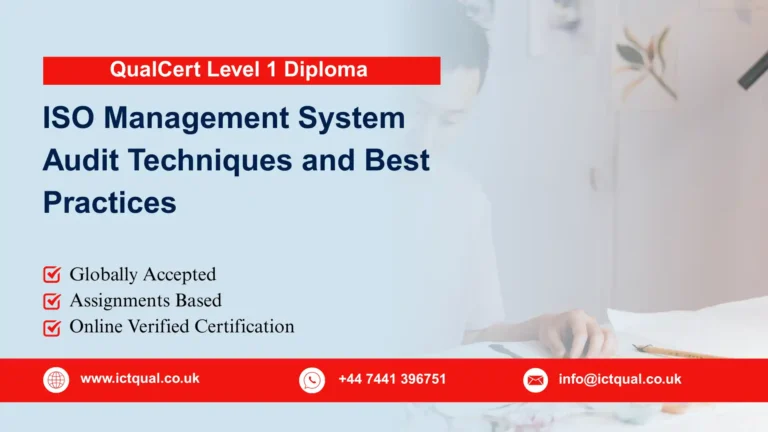Are you ready to take your career in process safety management to new heights? Look no further than the OTHM Level 7 International Diploma in Process Safety Management (PSM). This prestigious qualification is your ticket to unlocking a world of opportunities in industries where safety is paramount.
Gain in-depth knowledge of process safety principles and practices through our comprehensive curriculum. From hazard identification to emergency response planning, our diploma covers all aspects of process safety management, ensuring you’re equipped with the skills needed to excel in your role.
Experience hands-on learning like never before with our practical approach. Engage in real-world case studies and simulations to apply theoretical concepts to practical situations. Develop critical thinking and problem-solving skills that set you apart in the field of process safety.
Our diploma is globally recognized and respected by industry professionals. Developed in consultation with experts, our curriculum stays abreast of the latest industry trends and best practices. Stand out to employers and peers alike with a qualification that speaks volumes about your expertise and commitment to safety.
Open doors to new career opportunities with the OTHM Level 7 Diploma. Whether you’re looking to advance in your current role or explore new avenues in process safety management, our qualification gives you the edge you need to succeed. Take the next step towards becoming a leader in your field.
If you’re involved in process safety management or related disciplines, this diploma is tailor-made for you. Whether you’re a seasoned professional or just starting your career, our program is designed to meet your needs. Enroll today and join a community of like-minded individuals dedicated to making workplaces safer and more sustainable.
Don’t let this opportunity pass you by. Elevate your career with the OTHM Level 7 International Diploma in Process Safety Management. Enroll now and embark on a journey towards professional excellence and personal growth. Your future in process safety awaits.
Delivery Method is Blended (Online and Distance Learning)
In today’s complex industrial landscape, ensuring the safety of personnel, the environment, and assets is paramount. Industries such as oil and gas, chemical manufacturing, pharmaceuticals, and petrochemicals face inherent risks associated with their processes. To navigate these challenges effectively, professionals seek advanced knowledge and skills in process safety management. One avenue to acquire such expertise is through the OTHM Level 7 International Diploma in Process Safety Management (PSM).
Process Safety Management (PSM) is a systematic approach to managing the risks associated with industrial processes. It involves identifying potential hazards, assessing risks, implementing controls, and continuously monitoring and improving safety performance. PSM encompasses various elements, including process design, equipment integrity, operating procedures, training, and emergency preparedness.
The OTHM Level 7 International Diploma in PSM is a prestigious qualification recognized globally for its comprehensive coverage of process safety principles and practices. It is designed to equip professionals with the knowledge and skills needed to effectively manage process safety in diverse industrial settings.
The diploma curriculum covers a wide range of topics essential for process safety management. Participants learn about hazard identification techniques, risk assessment methodologies, safety systems design, process safety regulations, and emergency response planning. The comprehensive nature of the curriculum ensures that graduates are well-rounded in their understanding of process safety principles.
The OTHM Level 7 International Diploma in Process Safety Management (PSM) is a certification program designed to provide advanced knowledge and skills in managing process safety within various industries. This diploma aims to equip individuals with the expertise needed to identify, assess, and mitigate risks associated with industrial processes to ensure the safety of personnel, the environment, and assets. It covers topics such as hazard identification, risk assessment, emergency planning, regulatory compliance, and best practices in process safety management. This qualification is valuable for professionals working in industries where process safety is a critical concern, such as oil and gas, chemical manufacturing, pharmaceuticals, and petrochemicals.
In today’s dynamic industrial environment, ensuring process safety is non-negotiable. The OTHM Level 7 International Diploma in Process Safety Management (PSM) equips professionals with the expertise needed to navigate the complexities of process safety effectively. With its comprehensive curriculum, practical approach, industry relevance, and focus on professional development, the diploma program prepares graduates to excel in their roles and contribute to safer and more sustainable operations. Enroll today and embark on a journey towards mastering process safety management.
The OTHM Level 7 International Diploma in Process Safety Management qualification consists of 6 mandatory units for a combined total of 120 credits and 600 Guided Learning Hours (GLH) for the completed qualification.
Mandatory Units
| Sr# | Unit Title | Credit Hours |
|---|---|---|
| 1 | Introduction to Process Safety Management (PSM) | 10 |
| 2 | Process Safety Management Systems (PSMS), Safety Instrumented Systems (SIS) | 30 |
| 3 | Process Safety Engineering | 20 |
| 4 | Emergency Planning and Response | 20 |
| 5 | Legal and Regulatory Compliance | 20 |
| 6 | Environmental Protection in Process Safety | 20 |
The OTHM Level 7 International Diploma in Process Safety Management (PSM) is designed for professionals seeking advanced knowledge in process safety, risk management, and industrial operations. This course is ideal for individuals aiming to lead safety initiatives, implement robust PSM systems, and ensure compliance with international safety standards. It is perfect for those looking to enhance career prospects in high-risk industries such as oil & gas, chemical, and manufacturing sectors.
1. Senior Process Safety and Risk Management Professionals
- Process Safety Managers overseeing safety-critical operations
- Risk Management Specialists implementing hazard control strategies
- Safety Officers responsible for ensuring compliance with international PSM standards
- Engineers managing operational safety and loss prevention systems
- Professionals leading incident investigation and root cause analysis
- Team leaders driving safety culture and continuous improvement initiatives
2. Auditors and Compliance Professionals
- Internal auditors conducting process safety and compliance audits
- External auditors assessing organizational adherence to PSM standards
- Professionals aiming to master OSHA, API, and other process safety regulations
- Compliance Officers ensuring legal and regulatory compliance in industrial operations
- Consultants preparing organizations for ISO and OHS certifications
- Audit team leaders responsible for planning and reporting safety audits
3. Engineers and Technical Managers
- Chemical, Mechanical, and Process Engineers overseeing safe plant operations
- Project Managers managing high-risk projects with safety-critical elements
- Operations Managers integrating process safety strategies into daily operations
- Maintenance Managers ensuring equipment integrity and operational safety
- Technical leaders driving risk assessments and hazard management programs
- Professionals implementing preventive and mitigative safety measures
4. Career Seekers and Graduates
- Graduates aiming for advanced roles in process safety management
- Professionals enhancing employability in oil, gas, chemical, and industrial sectors
- Individuals seeking internationally recognized safety management credentials
- Career changers moving into process safety or risk management roles
- Candidates preparing for leadership positions in industrial safety departments
- Professionals aiming for MOFA or Embassy attestable certifications
5. Business Owners and Industrial Leaders
- Industrial and plant owners implementing robust PSM systems
- Entrepreneurs seeking compliance and operational credibility
- Business leaders aiming to reduce process-related risks and liabilities
- Startups focusing on safety-first culture for high-risk operations
- Professionals looking to attract international clients through certified safety standards
- Leaders standardizing operations to minimize incidents and losses
6. Professionals Focused on Continuous Improvement and Safety Culture
- Individuals developing process safety management strategies
- Professionals responsible for monitoring KPIs, audits, and safety performance metrics
- Employees implementing corrective and preventive safety actions
- Team leaders driving continuous improvement initiatives in industrial safety
- Consultants supporting organizations in achieving high safety standards
- Leaders aspiring to become recognized experts in process safety management
7. Regulatory and Environmental Compliance Professionals
- Environmental, Health, and Safety (EHS) specialists ensuring compliance
- Regulatory officers managing adherence to local and international safety laws
- Professionals implementing environmental and safety risk mitigation programs
- Consultants advising organizations on compliance audits and inspections
- Managers ensuring alignment of safety and environmental policies
- Professionals aiming to achieve internationally recognized PSM certification
Here are the outcomes for each of the listed study units:
Process Safety Management Systems
- Implement Process Safety Management System (PSM) framework.
- Measure the performance of the PSM system by applying leading, lagging metrics and Perform Compliance Audit of Process Safety Systems.
- Implement Management of Change (MOC) in Process Safety Management System (PSM).
- Review the regulatory and legal compliance of process safety systems and implement metrics that measure sustainability in the process safety area.
Risk Based Process Safety
- Apply HAZOP methods to process safety incidents.
- Quantify risk analysis measures in process safety industries.
- Evaluate the operational considerations of process safety systems by analysing Mechanical and Asset Integrity, Layer of Protection Analysis (LOPA) and Piping and Instrumentation diagram.
- Evaluate the operational readiness of process safety systems by analysing Safety Integrity Levels, Emergency Relief Systems, Pre-Startup review and Hot work permits
Process Safety Culture and Human Factors
- Evaluate process safety culture and human factor optimization techniques.
- Implement strategies that assess the mental health of workers, including postCovid and the impact of digitalization in process industries.
- Develop a stakeholder outreach contractor management programme.
- Implement a competence development framework.
Development as a Strategic Manager
- Identify personal skills to achieve strategic ambitions.
- Manage personal leadership development to support achievement of strategic ambitions.
- Evaluate the effectiveness of the leadership development plan.
- Advocate an employee welfare environment that supports organisational values.







